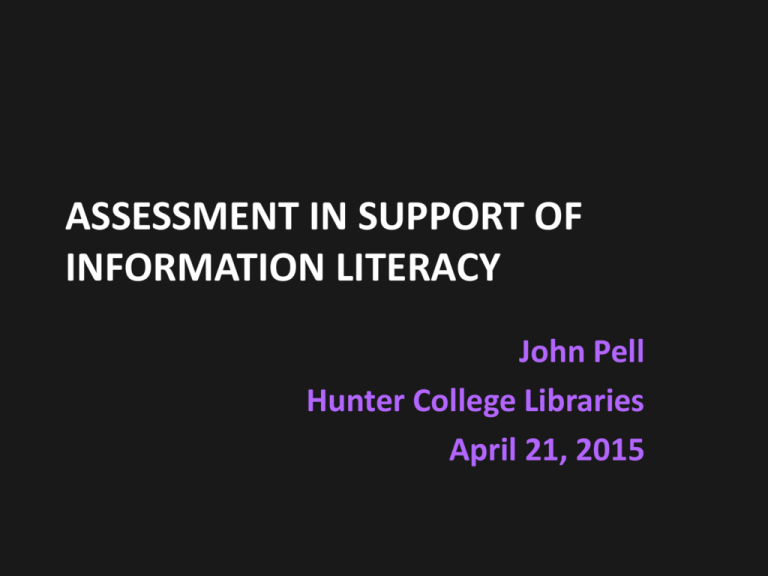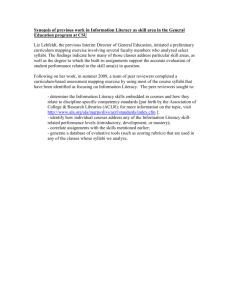Assessment in Support of Information Literacy
advertisement

ASSESSMENT IN SUPPORT OF INFORMATION LITERACY John Pell Hunter College Libraries April 21, 2015 WHAT WE’RE GOING TO TALK ABOUT: • What is information literacy? • What are some things Hunter’s Librarians are doing to support information literacy right now? • What is one of the Library’s Assessment Projects for Expanding its support for information literacy next year? • What are your questions? WHAT IS INFORMATION LITERACY? • ACRL Standards: “Information literacy is a set of abilities requiring individuals to recognize when information is needed and have the ability to locate, evaluate, and use effectively the needed information.”1 WHAT IS INFORMATION LITERACY? • SCONUL Core: “Information literate people will demonstrate an awareness of how they gather, use, manage, synthesize and create information and data in an ethical manner and will have the information skills to do so effectively.”2 WHAT IS INFORMATION LITERACY? • ACRL Framework: “Information literacy is the set of integrated abilities encompassing the reflective discovery of information, the understanding of how information is produced and valued, and the use of information in creating new knowledge and participating ethically in communities of learning.”3 Information literacy Outcomes (ACRL Standards)1 • Confers with instructors and participates in class discussions, peer workgroups, and electronic discussions to identify a research topic, or other information need • Develops a thesis statement and formulates questions based on the information need • Explores general information sources to increase familiarity with the topic Information Literacy Competencies & Understandings (SCONUL Pillars)2 • Understand the publication process in terms of why individuals publish and the currency of information • Identify controlled vocabularies and taxonomies for use in searching • Use appropriate data management software and techniques to manage data Information Literacy Knowledge Practices (ACRL Framework)3 • Identify interested parties, such as scholars, organizations, governments, and industries, which might produce information about a topic and determine how to access that information • Understand how and why some individuals or groups of individuals may be underrepresented or systematically marginalized within the systems that produce and disseminate information Hunter Library’s Support for Information Literacy • Research Toolkit & Other Web Tutorials • Reference Chats and Consultations • Course-related Instruction Sessions • Graded Assignments • Semester-Long Credit-Bearing Courses 2015-2016 Assessment Project • Partner with 1st Year Writing Program • Assess Impact of Linked Library 100 and English 120 sections on Student Writing and Research • Close the Loop: Strengthen Learning Communities by Developing Synergistic Approaches to Lesson Plans and Assignments • Close the Loop: Strengthen Learning Communities by Involving Librarian Liaisons with their Subject Areas 2015-2016 Assessment Project • John Pell: Pre-Nursing/Science & Medical Professions • Hal Grossman: Education/Psychology or Social Sciences/Pre-business & Pre-law • Sara Ward & Stephanie Margolin: Humanities & Arts/Education/Social Sciences • Phil Swan & Adina Muliken: History REFERENCES 1. Association of College & Research Libraries. Framework for Information Literacy for Higher Education. www.ala.org. 2015. http://www.ala.org/acrl/standards/ilframework#exploration. Accessed April 21, 2015. 2. SCONUL Working Group on Information Literacy. The SCONUL Seven Pillars of Information Literacy. 2011. http://www.sconul.ac.uk/sites/default/files/documents/coremod el.pdf. Accessed April 20, 2015. 3. Association of College & Research Libraries. Information Literacy Competency Standards for Higher Education. Chicago, Illinois: American Library Association; 2000. http://www.ala.org/acrl/standards/informationliteracycompetenc y. Accessed April 21, 2015.







